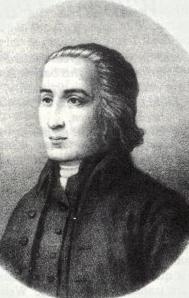Christian Thought From the Eighteenth to the Twentieth Century/Methodism in England
- "...in the original Welsh it is 'The Dawn of Welsh Calvinistic Methodism'. Bennett gives an excellent account of this crucial experience. What was it? To me, there is only one expression to use. It was the expression used by these men themselves and by their successors. It was a baptism 'of fire' or a 'baptism of power'. What I would emphasize particularly is that Harris was already converted, had already received forgiveness of sins, and he knew that he had it, and had been dancing in joy. But it was now just over three weeks later that he received this crucial experience which turned him into a flaming evangelist. What was it? This is how he describes what happened as he was there sitting in the tower and reading and praying: 'Suddenly I felt my heart melting within me like wax before a fire, and love to God for my Saviour. I felt also not only love and peace, but a longing to die and to be with Christ. Then there came a cry into my soul within that I had never known before - Abba, Father! I could do nothing but call God my Father. I knew that I was His child, and He loved me and was listening to me. My mind was satisfied and I cried out, Now I am satisfied! Give me strength and I will follow Thee through water and fire'." (Martyn Lloyd-Jones: Howell Harris and Revival, 1973).
Eighteenth century Great Britain, together with France and the German states, appears as the world's main stage for "The Enlightenment Movement" that began in the seventeenth century. The purposeful application of reason in all matters of life and as first authority in any decision, attacked first and foremost various manifestations of Christian Thought.
- How did Christian thinkers and writers in the British Empire react to this powerful movement?
- Were there different responses and standpoints among Christian thinkers, and how did they look like?
Study the material below. Some links contain longer PDF files with many pages. We expect you to read all provided information.
- William Bristow: Enlightenment, in: Stanford Encyclopedia of Philosophy,2010.
- National variations of the enlightenment movement, in: Wikipedia.
- Ezio Vailati, Timothy Yenter: Samuel Clarke, in: Stanford Encyclopedia of Philosophy, 2009.
- The flowering of British Deism (1690-1740), in: Citizendium.
- Deistic Solution of the Problem of Evil, in: Source unknown [PDF.]
- J C Ryle: The Christian Leaders of England in the Eighteenth Century, 4th ed.[PDF]
- Martyn Lloyd-Jones: Howell Harris and Revival, 1973.
- Martyn Lloyd-Jones: William Williams and Welsh Calvinistic Methodism, 1968.
If you are not yet a registered user at Wikipedia, please register now here.
- Is there any prominent British Christian thinker of the eighteenth century that is not published with his/her own page on Wikipedia?
If that is the case, start your own Wikipedia page about that person in your private Wikipedia "Sandbox". In some cases a "Stub" of the person of your choice does exist already. Nevertheless, start additions to that stub in your Sandbox. From now on all your publication assignments will first be performed on your Wikipedia user/talk/sandbox pages. Make yourself comfortable there and always cite your own Wikipedia user, talk, or sandbox link, when communicating with us.
From left to right: Howell Harris, William Pantycelyn Williams, J C Ryle.



